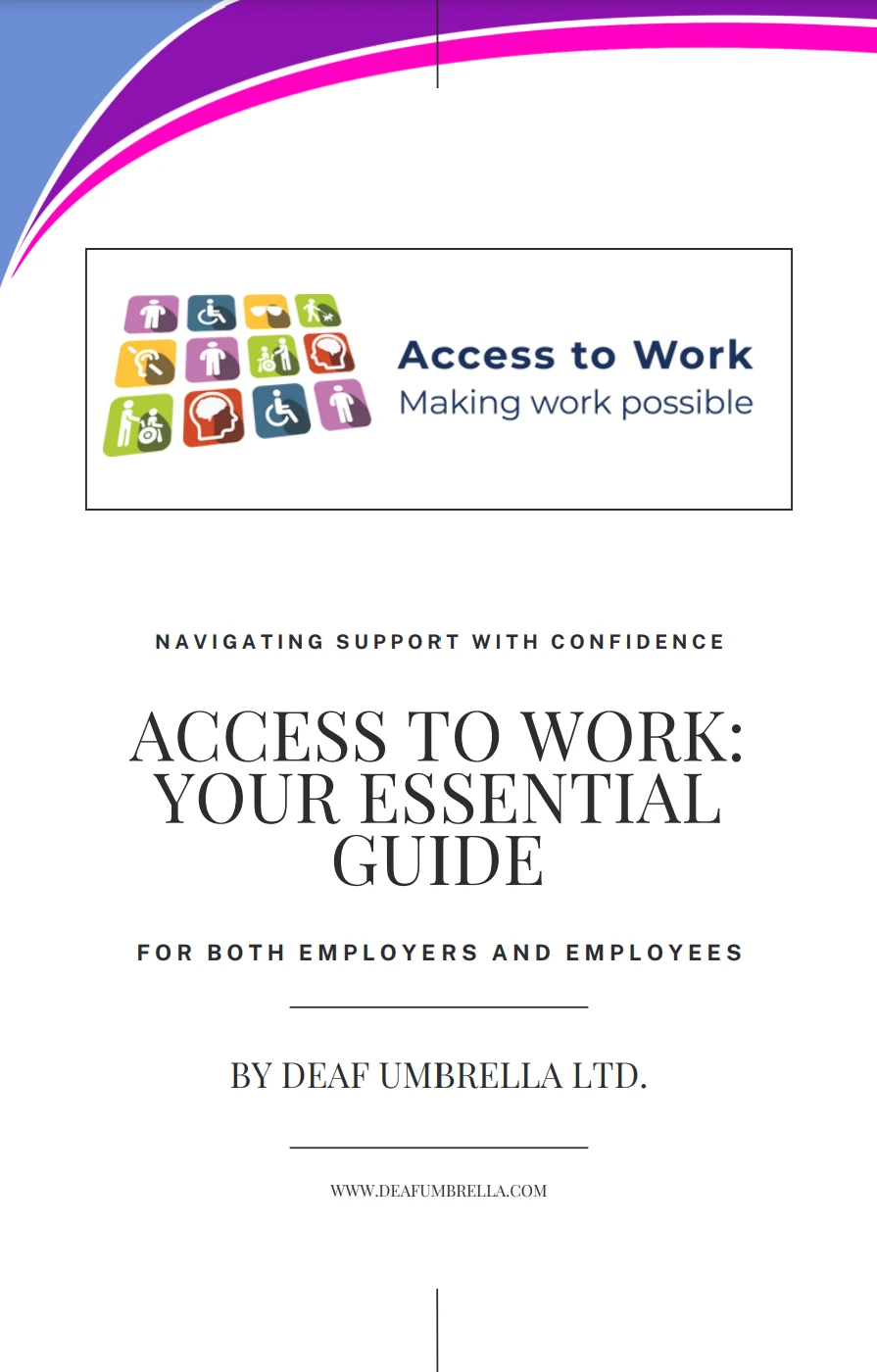How to hire Deaf candidates
- Deaf Umbrella

- Oct 28, 2024
- 4 min read
Updated: Feb 26, 2025
At Deaf Umbrella, we have seen firsthand the incredible value that Deaf employees bring to the workplace. Yet, many hiring managers and recruiters are unsure how to approach the hiring process for Deaf candidates. Today, we are here to show you just how simple and rewarding it can be!

The Benefits of Hiring Deaf Employees
Before we dive into the process, let's highlight why hiring Deaf individuals is a smart move for your company:
Enhanced Problem-Solving Skills: Deaf people often develop unique approaches to overcome communication barriers.
Increased Diversity: A diverse workforce leads to more innovative and creative solutions.
Improved Customer Service: Deaf employees can better serve Deaf and Hard of Hearing customers.
Loyalty and Retention: Deaf employees often show high levels of loyalty to inclusive employers.
Enhanced Team Communication: Teams learn to communicate more clearly and effectively.
Deaf employees are actually average or above average in performance, quality and quantity of work, flexibility and attendance.
The Interview Process: Before, During, and After
1. Before the Interview
First of all, you might need to contact the deaf candidate by email or indeed any other way but calling to their phone. Remember: They are deaf. Definitely don’t leave a voicemail when they don’t answer your call!
Ask about communication preferences: Some candidates may prefer a British Sign Language (BSL) interpreter, while others might opt for written communication.
Book a qualified BSL interpreter if needed: Ensure you have a professional interpreter available for the interview. (Contact us for London and Southeast region BSL support)
Prepare your team: Brief your team on Deaf awareness and etiquette.
✨ TOP TIP: Try to research some tips about deaf awareness such as how to interact with a Deaf person. Learning a few phrases in British Sign Language or fingerspelling would help.
2. During the Interview
Maintain eye contact with the candidate: Even when an interpreter is present, direct your attention to the candidate. Learn how to work with a sign language interpreter HERE.
Try to conduct the meeting in a well-lit room away from lots of external noise or visual disruptions. Sit down in front of the applicant with the interpreter seated next to you.
Speak clearly and at a normal pace and avoid talking to the deaf person in the third person using phrases such as "Tell her/him," or "Explain to her/him"...
Use visual aids when possible: Charts, diagrams, or written notes can enhance understanding.
✨ TOP TIP: Treat the job candidate with respect and don't patronise them. And also, and above all, don't say things like "You speak very well for someone who is deaf", or "Wait, you can drive?" (Read more about Audism).
3. After the Interview
If the deaf candidate is qualified for the role, then you will need to ask them about which accommodations would help them succeed in their role. They might need assistive technology, apps and online tools to carry out their job responsibilities without impediments. (Access to Work AtW can pay for support and equipment in the workplace).
Ensure that the company develop an understanding of Deafness and Deaf Culture by arranging a Deaf Awareness Training session. You and your company will support equality and will be aware of how to communicate with your Deaf colleagues. It has a positive impact on both the business as a whole and the Deaf employee. This is a “win-win” situation for everyone.

If you are unsure of the appropriate way to proceed in a particular situation, just relax, ask, and be open to feedback. If you are curious it will be perfectly OK to ask a question of the deaf person. They will not be offended, will be happy to help and will be delighted that you want to learn more!
Access to Work: Making Workplaces Accessible
The UK government's Access to Work (AtW) scheme can provide funding for workplace adjustments, including:
Hearing aids
Specialist products (listening equipment, flashing-light fire alarms, amplified telephones and textphones)
Communication Support Workers help deaf employees to communicate in meetings, take notes at work or answer the phone.
This support ensures that Deaf employees can perform their roles effectively, at little to no cost to the employer.
Deaf workers, where they are given the opportunity, are committed and engaged; the only thing they need is the right support, tools and encouragement to perform to their full potential and be productive in what they do.
Download our free resources: https://www.deafumbrella.com/ebook-atw
At Deaf Umbrella, we're committed to bridging the gap between Deaf job seekers and inclusive employers. Our Job Club provides support to Deaf individuals in their job search, and we offer guidance to employers on creating accessible workplaces.
Look at the selection of deaf people actively looking for a job from our job club:
TRADES:
Mr. P. – Mitcham – Looking for painting and decorating – 25 years experience
Mr. B. – Kilburn – Delivery Driver – 9 years experience
Mr. H. – Bromley – Electrician – just finished College
Mrs. L. – Greenwich – Cleaner – 5 years experience
ADMIN:
Mr. J. - Kensington – Looking for an admin roll – 20 years experience
Mr. A. – Bromley – Wants a nursery childcare apprenticeship – 3 years work experience
Mrs. J. - School Teacher assistant, administration, or supermarket
Mr. P. - London - Part time Specialist Outreach Worker
RETAIL:
Mr. C. – Bexley – Wants retail work – no experience
Remember, hiring a Deaf employee isn't just about filling a position – it's about enriching your team with unique perspectives and skills.









Comments